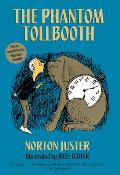Brother, Can You Paradigm for the Tollbooth?
With all the attention flowing to The Phantom Tollbooth on its fiftieth anniversary, I decided to do what Peter Sagal warned against: to reread the book as an adult.
The copy I found on my shelf was issued for the thirty-fifth anniversary, with a foreword by Maurice Sendak. I was surprised to find that my copy is also autographed by author Norton Juster and artist Jules Feiffer. I’ve met Juster once or twice, but never asked for his signature, and I’ve never met Feiffer. I guess I bought a copy they signed for Books of Wonder or another store, but I’d prefer to think of those autographs as a mysterious apparition.
Sagal’s warning and my own memory of first reading the novel (I vaguely liked it, didn’t love it) meant I wasn’t subject to crushing disappointment on rereading. Juster’s play with words and logic is clever throughout, but it’s a single note struck over and over.
The young hero Milo is quite a blank slate; feeling bored is hardly a galvanizing personality trait. At least he’s not a paragon, however. As in some other fantasies written for the same age range, the protagonist’s lack of a strong, distinct personality might make it easier for young readers to project themselves into his adventures.
I had long thought of The Phantom Tollbooth as a portal fantasy, but I was struck by how closely the book followed that standard map:
The copy I found on my shelf was issued for the thirty-fifth anniversary, with a foreword by Maurice Sendak. I was surprised to find that my copy is also autographed by author Norton Juster and artist Jules Feiffer. I’ve met Juster once or twice, but never asked for his signature, and I’ve never met Feiffer. I guess I bought a copy they signed for Books of Wonder or another store, but I’d prefer to think of those autographs as a mysterious apparition.
Sagal’s warning and my own memory of first reading the novel (I vaguely liked it, didn’t love it) meant I wasn’t subject to crushing disappointment on rereading. Juster’s play with words and logic is clever throughout, but it’s a single note struck over and over.
The young hero Milo is quite a blank slate; feeling bored is hardly a galvanizing personality trait. At least he’s not a paragon, however. As in some other fantasies written for the same age range, the protagonist’s lack of a strong, distinct personality might make it easier for young readers to project themselves into his adventures.
I had long thought of The Phantom Tollbooth as a portal fantasy, but I was struck by how closely the book followed that standard map:
- Milo goes through an unusual opening to a fantasy world. That portal’s a tollbooth, but it might as well be a mirror, a wardrobe, or a cyclone.
- Milo’s status as a newcomer allows the characters of that world to explain it all for the benefit of the readers.
- There’s something wrong in that world (Princesses Rhyme and Reason are missing), and Milo gets the mission to fix it. Because the fate of the world must always depend on an eleven-year-old who pops up out of nowhere.
- Over the course of a journey, Milo accumulates companions (Tock, the Humbug), knowledge (so many valuable lessons about life), and tools (a stolen sound) that allow him to fulfill that mission. Whatever was wrong with that world is fixed, and the status quo ante is restored.
- After a celebration, Milo returns to his own world, more mature and sure of himself than he began.



2 comments:
So you sort of liked it okay? Better than rereading Scalawagons?
Well, anything’s better than that! (I plan to write about Scalawagons on Tuesday.)
Yeah, Phantom Tollbooth was okay. As I said, it was never a favorite of mine, so I had little to lose. I think it’s a good book for kids just discovering the power of systematic, reflective thinking. But its structure is very familiar, as are its insights once you’ve gotten beyond that stage.
Post a Comment